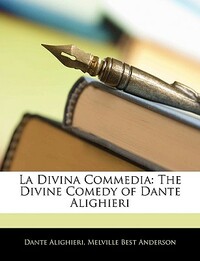Take a photo of a barcode or cover
302 reviews for:
La Divina Commedia: The Divine Comedy of Dante Alighieri
Melville Best Anderson, Dante Alighieri
302 reviews for:
La Divina Commedia: The Divine Comedy of Dante Alighieri
Melville Best Anderson, Dante Alighieri
challenging
dark
slow-paced
Plot or Character Driven:
A mix
Strong character development:
Yes
medium-paced
Plot or Character Driven:
Plot
Strong character development:
Complicated
Loveable characters:
Complicated
Diverse cast of characters:
No
Flaws of characters a main focus:
Yes
compared to the inferno, this was just not as interesting- perhaps i will change my mind on that. however, it did make me interested for paradiso.
I'm so glad I've finally read this book; it's filled with rich imagery and a fascinating journey. The translation is easy to understand yet maintains its poetic nature and the notes are very helpful.
slow-paced
adventurous
challenging
It took me four and a half years to finish this book. It was that slow. After reading [b:Inferno|15645|Inferno|Dante Alighieri|http://photo.goodreads.com/books/1166676681s/15645.jpg|2377563] in college I was pretty excited to the read the rest of the Divine Comedy.
I hear [b:Paradiso|32812|Paradiso|Dante Alighieri|http://photo.goodreads.com/books/1204385191s/32812.jpg|9771852] is a lot better, so I managed to (eventually) make it through this one.
I hear [b:Paradiso|32812|Paradiso|Dante Alighieri|http://photo.goodreads.com/books/1204385191s/32812.jpg|9771852] is a lot better, so I managed to (eventually) make it through this one.
boring AND inscrutable AND mostly disses to centuries-dead and not-famous political figures? sign me up for anything else please
Dante's epic journey continues as he and Virgil ascend through the seven levels of Purgatory (corresponding to the seven deadly sins), where souls must suffer and be purified before entering Paradise. The imagery here is not quite as vivid as that in Inferno, and the torments less horrifying. Which makes sense, since the souls in Purgatory have been saved and will (eventually) make their way to Heaven, unlike the souls of the damned in Hell.
In Inferno, the souls were classified according to their sin, and each soul was associated with but one sin. Thus, if a soul were a glutton and a fraud, there was no provision for that soul to be punished for both sins--they would instead be punished as one or the other. There was no travel between circles, except for Dante and his guide.
Purgatory, on the other hand, is designed for travel. A saved soul starts at the bottom level, and ascends upward, stopping at each level or sin of which he has been guilty, and staying as long as his particular sins require. Thus one may be guilty of pride, envy, wrath, and so on, and will be punished for (and purified from) each as appropriate. If one is not guilty of a particular sin, he simply passes through that level without pain or pause. (There is also a provision for accelerating the process or skipping some levels, if the departed soul is prayed for by those still living.) This arrangement was, in many ways, much more convicting to me than the single-sin system in Inferno. If asked to pick the circle of Hell in which I would reside (apart from the saving grace of Christ), I would not know what to choose. I am far too varied in my sins. But Purgatory allows me to admit my fault at each new level. I, too, would spend countless years on the terrace of pride, then envy, then wrath, and what-have-you.
There is, of course, the issue of Purgatory as a spiritual concept in and of itself--an idea that many (including myself) do not accept. Still, the poem has merit, even for those whose beliefs about the afterlife do not include this painful refining process. After all, the sins derided are still sins, and Christians undoubtedly undergo a certain amount of discipline for sin in this life, regardless of whether they move directly to heaven in the next.
Bottom line: A convicting read. As with Inferno, it works well read aloud, and would likely make an excellent audiobook (though I would recommend digesting it in short chunks to maximize absorption and retention). Again, many of the cultural and historical references will be unfamiliar to the average lay reader, so a well-annotated version (such as Ciardi's) is key.
In Inferno, the souls were classified according to their sin, and each soul was associated with but one sin. Thus, if a soul were a glutton and a fraud, there was no provision for that soul to be punished for both sins--they would instead be punished as one or the other. There was no travel between circles, except for Dante and his guide.
Purgatory, on the other hand, is designed for travel. A saved soul starts at the bottom level, and ascends upward, stopping at each level or sin of which he has been guilty, and staying as long as his particular sins require. Thus one may be guilty of pride, envy, wrath, and so on, and will be punished for (and purified from) each as appropriate. If one is not guilty of a particular sin, he simply passes through that level without pain or pause. (There is also a provision for accelerating the process or skipping some levels, if the departed soul is prayed for by those still living.) This arrangement was, in many ways, much more convicting to me than the single-sin system in Inferno. If asked to pick the circle of Hell in which I would reside (apart from the saving grace of Christ), I would not know what to choose. I am far too varied in my sins. But Purgatory allows me to admit my fault at each new level. I, too, would spend countless years on the terrace of pride, then envy, then wrath, and what-have-you.
There is, of course, the issue of Purgatory as a spiritual concept in and of itself--an idea that many (including myself) do not accept. Still, the poem has merit, even for those whose beliefs about the afterlife do not include this painful refining process. After all, the sins derided are still sins, and Christians undoubtedly undergo a certain amount of discipline for sin in this life, regardless of whether they move directly to heaven in the next.
Bottom line: A convicting read. As with Inferno, it works well read aloud, and would likely make an excellent audiobook (though I would recommend digesting it in short chunks to maximize absorption and retention). Again, many of the cultural and historical references will be unfamiliar to the average lay reader, so a well-annotated version (such as Ciardi's) is key.




